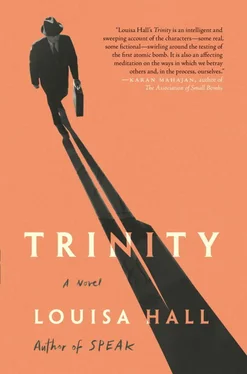I thought that such kindness, which we produce in order to ameliorate our own guilt, was in fact an extraordinarily self-absorbed impulse, a way of decreasing the weight of our burden while also removing someone else’s right to feel anger.
And by then, in the angry, unforgiving state I was in, I thought: What was wrong with the impulse to try Oppenheimer for his betrayals?
Why should we hold tribunals for war crimes and not more minute, personal errors? Such smaller crimes, I thought to myself, are in some ways even worse than the grand crimes, because they’re not committed out of obedience, or in the name of higher ideals, but because we simply forget our responsibility to a person who loves us.
Or because we feel an irresistible impulse. Or because we allow ourselves to believe that it is excusable to commit some small, personal crime because we are not committing a more grandiose form of violence, like mass murder in warfare, or one of those other outsized forms of human carnage that we all enjoy protesting against because they distract us momentarily from our minute errors, the endless cascades of smaller but more pointless and cowardly little betrayals.
Why, I thought, striding down the sidewalks of Princeton—a smallish woman, dark eyed and foreign-feeling and never quite at home in any place I arrived—why should a man in this uncertain, violent world be permitted to hide behind vagueness, behind claims about the mystery of his internal existence?
Shouldn’t we all live our lives knowing it’s our responsibility to account for ourselves with precision?
Those were the bitter thoughts that had lodged themselves in my heart by the time I crossed campus in the ugliness of that winter afternoon, the lawns brown, the trees stripped, the fallen leaves scuttling off. And by the time I arrived at Oppenheimer’s new office, at the end of that dark hallway, and he’d turned in from the window and seen me standing there on the threshold, it was clear to me as it must have been clear to him, also, that I’d come to question him so brutally that only one of us would emerge living. And when I’d taken my seat opposite him and he’d begun talking about our inability to know all the aspects of any given particle, I interrupted him rudely and began to ask questions about why he’d lied so much in those years leading up to the trial.
Then, as I’ve said, he turned to the window, and we both waited a long time, while the light began to drain out of the sky, and the bare trees became rust red rather than gray.
And finally he turned back from the window, and uttered that hazy answer about “the whole story of a man’s life,” and even then, I continued to interrogate him, and he continued evading my questions, until finally he turned and looked out the window again, toward the pond where I used to watch those pairs of mallards, and where in the winter my sister and I used to ice-skate.
His profile was emaciated: a beak of a nose, those shaggy eyebrows. I noticed that his mouth twitched at one corner. The skin sagged from his cheekbones.
Then, suddenly, I remembered that bee. I remembered that wounded bee, dragging its wing on the pavement, the bee I’d destroyed with such outlandish retaliation because I was startled.
And I realized I was watching Oppenheimer with the same sad, tired curiosity with which I’d watched that bee, dragging itself in those awful circles. I’d treated him, I realized, too harshly. I realized I’d felt, for a moment, as if all the new uncertainty in my life—the forces of destruction that had started to gather around me in the kitchen when that woman called; or perhaps the forces of destruction that had been gathering around me since I was a child in that house in Princeton, waiting on the carpeted stairs to witness the violence that was sure to take place; or perhaps indeed the forces of destruction that had gathered around me everywhere I went in this world, in which people I didn’t know in positions of power possessed such weapons as I could barely bring myself to imagine—as if all the uncertainty in the world had been caused by this one man, and that therefore he should be punished.
And yet, watching him now, I realized how small and how weak he really was. I realized that he, too, lived in the same uncertain world, and that he had always lived in that world, even when he was making those weapons, imagining he was in control of their outcome, not yet knowing that he in fact had no say over when and how the army would use them, indeed over when and how the army and the president had already decided to use them, and for what reasons, and to what end. I had imagined—he had imagined—that he had some power over those forces, but in fact he was only a small, helpless part of a process that was bigger than him and that he hadn’t yet comprehended.
His major mistake, I realized, had been to believe that he understood. That he could set himself apart from history and see his role in it, and therefore act well, and with full comprehension.
But in the end he, too, had lived caught up in the incomprehensible tumult, caught in the same uncertainty I’d always hated, and why he’d done what he did to take control of that chaos didn’t matter as much anymore. I was sorry for what he’d suffered, as a result of the suffering he’d caused other people.
THEN, FOR SOME TIME, WHILE HE LOOKED OUT THE WINDOW, WE SATtogether in that silence that rose up around us. Outside, the light had fallen to the point that the edges of things were lined with thin brightness, so that solid objects like trees and buildings seemed flat and insubstantial, like cardboard illuminated from behind.
In that light, nothing seemed real. Everything seemed to be shifting into the new order of evening, taking new shape, becoming less solid. Even the objects inside, the desk, the file cabinet, even Oppenheimer himself seemed to be growing flimsy and thin, as though, if I’d tried to reach out to touch him, my hand might have moved through him.
For a while I watched him, sitting there at his desk, with the same unsteady feeling I’d lived with since that woman called and informed me that the idea I’d had of my husband was false, or at least no more true than the idea she’d had of my husband, so that the original became confused with its shadow, and neither one was really solid, neither one could be grasped fully.
In the same way, Oppenheimer had lost his definite shape. As if, in his office, sitting in silence, we sat together in the chaos of a kaleidoscope that’s turned between slides, before the blurred geometries have resolved themselves once again into crystals.
For a moment, he’d become insubstantial, as though my hand might have passed through him. As though he could have passed through me, into me, infecting me, becoming more real inside me than he was in the real world.
“You’ll have to forgive me,” he said finally. “I’m in some pain. My hearing and speech are quite poor at this point.”
I CAN’T REMEMBER WHICH QUESTIONS I INVENTED TO FINISH THEinterview after that. I tried, to whatever extent I was able, to be easy on him when I could. I realized I’d been a bully, so I was careful to assist him in the work of picking himself up and brushing himself off after that embarrassing silence.
And slowly—though never completely—he assembled himself into a person again. He told me his anecdotes, crystallized over a lifetime. He demonstrated several points about theoretical physics. He explained the picture of Kitty. He told me a story about a friend of his on St. John and a turtle he and his daughter had released back to the ocean. He told me about a dinner party he and Kitty had gone to in Paris, thrown by an old friend from Berkeley.
He told me about that awful night on the mesa, after they’d exploded the Nagasaki bomb, a bomb he hadn’t known would be dropped, and how the GIs threw a party he’d felt obligated to attend.
Читать дальше












